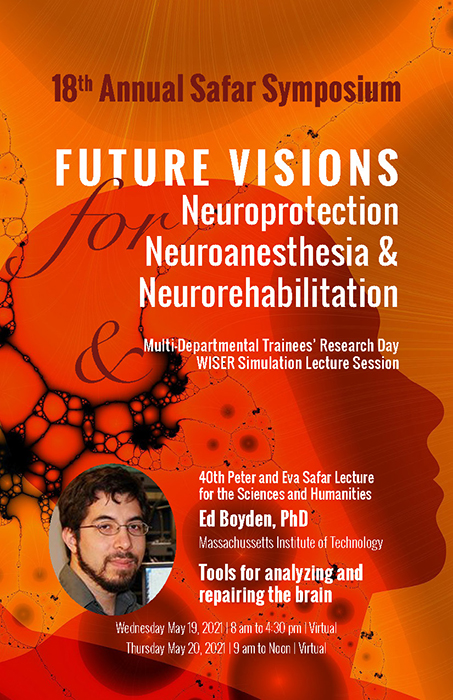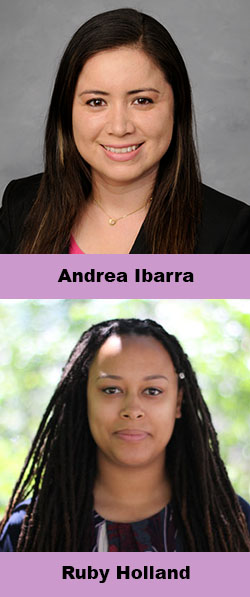 The 18th annual Safar Symposium and 11th annual Multi-Departmental Trainees’ Research Day was held on May 19-20, 2021. Building upon the Peter and Eva Safar Lectureship established in 1980 by Peter M. Winter, MD, (former chair of the Department of Anesthesiology and Critical Care Medicine), this yearly event honors the late Dr. Peter Safar and his wife Eva for their contributions to the scientific community and highlights current research in areas spanning Dr. Safar’s scientific career and interests. The theme of the 2021 event was Future Visions for Neuroprotection, Neuroanesthesia, and Neurorehabilitation. Due to the Covid-19 pandemic, this year’s event was held virtually but attracted a broad national and international audience. A total of 362 people from the USA (including Hawaii) and 19 other countries registered for the symposium.
The 18th annual Safar Symposium and 11th annual Multi-Departmental Trainees’ Research Day was held on May 19-20, 2021. Building upon the Peter and Eva Safar Lectureship established in 1980 by Peter M. Winter, MD, (former chair of the Department of Anesthesiology and Critical Care Medicine), this yearly event honors the late Dr. Peter Safar and his wife Eva for their contributions to the scientific community and highlights current research in areas spanning Dr. Safar’s scientific career and interests. The theme of the 2021 event was Future Visions for Neuroprotection, Neuroanesthesia, and Neurorehabilitation. Due to the Covid-19 pandemic, this year’s event was held virtually but attracted a broad national and international audience. A total of 362 people from the USA (including Hawaii) and 19 other countries registered for the symposium.
Dr. Ed Boyden, Professor of Brain and Cognitive Sciences, Media Arts and Sciences, and Biological Engineering and Y. Eva Tan Professor in Neurotechnology, Massachusetts Institute of Technology delivered the 40th Peter and Eva Safar Annual Lecture in Medical Sciences and Humanities, “Tools for Analyzing and Repairing the Brain.”
 The Trainees’ Research Day is a collaboration between the Departments of Anesthesiology and Perioperative Medicine, Critical Care Medicine, Emergency Medicine, Neurological Surgery, and Physical Medicine & Rehabilitation (PM&R), as well as the Peter M. Winter Institute for Simulation Education and Research (WISER). Forty-two posters from trainees in the collaborating departments were presented in seven breakout rooms, two dedicated to the Department of Anesthesiology and Perioperative Medicine. Award winners from our department include Andrea Ibarra, MD, MS, a T32 postdoctoral scholar working with mentors Aman Mahajan, MD, PhD, MBA, and Kimberly Howard-Quijano, MD, MS. Dr. Ibarra won the Best Abstract award in the Clinical/Health Services category for her presentation “The Impact of Socioeconomic Status in Patients with Left Ventricular Assist Devices.” Ruby Holland, a graduate student in the University of Pittsburgh’s Medical Scientist (MD, PhD) Training Program won the Best Abstract award in the Basic Science category for her presentation “Activation of Kappa Opioid Receptor-Expressing Neurons in the Ventral Tegmental Area Attenuates Opioid Withdrawal.” Ruby has been working with mentor Sarah Ross, PhD.
The Trainees’ Research Day is a collaboration between the Departments of Anesthesiology and Perioperative Medicine, Critical Care Medicine, Emergency Medicine, Neurological Surgery, and Physical Medicine & Rehabilitation (PM&R), as well as the Peter M. Winter Institute for Simulation Education and Research (WISER). Forty-two posters from trainees in the collaborating departments were presented in seven breakout rooms, two dedicated to the Department of Anesthesiology and Perioperative Medicine. Award winners from our department include Andrea Ibarra, MD, MS, a T32 postdoctoral scholar working with mentors Aman Mahajan, MD, PhD, MBA, and Kimberly Howard-Quijano, MD, MS. Dr. Ibarra won the Best Abstract award in the Clinical/Health Services category for her presentation “The Impact of Socioeconomic Status in Patients with Left Ventricular Assist Devices.” Ruby Holland, a graduate student in the University of Pittsburgh’s Medical Scientist (MD, PhD) Training Program won the Best Abstract award in the Basic Science category for her presentation “Activation of Kappa Opioid Receptor-Expressing Neurons in the Ventral Tegmental Area Attenuates Opioid Withdrawal.” Ruby has been working with mentor Sarah Ross, PhD.
Morning presentations on the first day of the symposium included:
- “Application of Quantitative Systems Pharmacology to Identify Novel Targets and Therapeutic Approaches for Traumatic Brain Injury” by Mark E. Schurdak, PhD, Director of Operations, University of Pittsburgh Drug Discovery Institute and Associate Professor, Computational and Systems Biology, University of Pittsburgh
- Future Visions for Neuromonitoring in Neurocritical Care” by Emanuela Keller, MD, Professor of Professor of Medicine, Intensive Care and Emergency Medicine, and Neurocritical Care, University Hospital of Zurich, Switzerland
- “Big Data and Continuous EEG Monitoring of Cardiac Arrest” by Jonathan Elmer, MD, MS, Assistant Professor, Emergency Medicine, Critical Care Medicine, and Neurology, University of Pittsburgh School of Medicine
- “The Future for Rehabilitation in Neurocritical Care” by Sapna R. Kudchadkar, MD, PhD, FCCM, Associate Professor, Anesthesiology and Critical Care Medicine, Pediatrics, and PM&R, Johns Hopkins University School of Medicine
- “Machine Learning Predicting Mortality and Morbidity in Children with Neurological Injury in the Pediatric Intensive Care Unit” by Neil Munjal, MD, NIH T32 Postdoctoral Scholar, Pediatric Critical Care Medicine, UPMC Children’s Hospital of Pittsburgh
- “Leveraging Data Science for Discovery and Translation in Traumatic Brain Injury?” by Adam R. Ferguson, MS, PhD, Director, Data Science Brain and Spinal Injury Center and Associate Professor, Department of Neurological Surgery, Weill Institute for Neuroscience, University of California, San Francisco
WISER director Paul E. Phrampus, MD, moderated day two of the symposium on May 20th, with the theme of Challenges in Maintaining Simulation Excellence and featuring the following presentations:
- “Getting WISER During a Pandemic” by John O’Donnell, DrPh, CRNA, Professor and Chair, Department of Nurse Anesthesia, University of Pittsburgh
- “iTEACHER: Faculty Development Project on Emergency Resident Training in China” by Joseph Liu, CHSE, MD, Associate Professor and Vice Director of Emergency Department, Peking Union Medical College Hospital, China
- “The COVID Challenges and the New Normal in Thai Simulation” by Usapan Surabenjawong, MD, Department of Emergency Medicine, Siriraj Hospital, Mahidol University
- “Whaddarya? Cultural Considerations in Simulation and Interprofessional Education” by Janice C. Palaganas, PhD, APRN, ANEF, FJAP, FAAN, FSSH, Chief Executive Officer, The Institute for Interprofessional Innovations; Assistant Professor of Anaesthesia, Massachusetts General Hospital, Department of Anesthesia, Critical Care & Pain Medicine, Harvard Medical School
- “Leaning into the Future” by Robert Armstrong, MS, Executive Director, Sentara Center for Simulation and Immersive Learning, Eastern Virginia Medical School
- “Facilitator Training on Demand” by Jannet Lee-Jayaram, MD, CHSE, Association Director, SimTiki Simulation Center; Assistant Professor of Pediatrics, University of Hawaii, John A Burns School of Medicine
The lectures from the 2021 Symposium are now available online for viewing on the Safar website.
